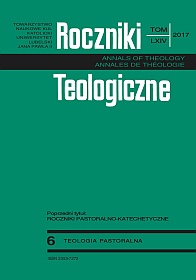Focusing on the Basic Elements of Christian Faith in the Service of Renewal. The Scope and Effects of the Encyclical Deus Caritas Est more than Ten Years after Its Publication
Abstract
This paper is an attempt to outline the scope and effects of Pope Benedict XVI’s first encyclical Deus Caritas Est more than ten years after its publication in January 2006. It depicts the context of this encyclical within the papal Magisterium since Vatican II and the scope of this document as a call for the Church to readjust Herself according to the hierarchy of truths and to focus on the basic elements of Christian faith in order to renew Herself in Her mission in the service of love. In order to achieve more of the desired effects of both Pope Benedict’s and Pope Francis’ pastoral Magisterium for the renewal of the Church and also of theology, the theological curriculum needs to integrate Caritas Science as a theological discipline which studies this essential dimension of the Church from both theological and interdisciplinary perspectives.
References
Baumann, Klaus. “Die Bedeutung der Enzyklika Deus caritas est für die Kirche und ihre Caritas.” In Gott ist Caritas. Impulse zur Enzyklika über die christliche Liebe, edited by Martin Patzek, 9-29. Kevelaer: Butzon & Bercker, 2007.
Baumann, Klaus. “‘Die Liebe ist möglich …’ (DCE, 39). Zur anthropologischen Dimension der Enzyklika ‘Deus caritas est.’” In Liebe bewegt … und verändert die Welt. Programmansage für eine Kirche, die liebt, edited by Peter Kasvogt and Heinrich Pompey, 67-84. Paderborn: Bonifatius, 2008.
Baumann, Klaus. “Mit dem Papst von 100 auf 110—Caritas als roter Faden im Lehramt Benedikts XVI.” News. Caritas-Mitteilungen für die Erzdiözese Freiburg 2(2013): 9-11.
Baumann, Klaus. “Die katholische lehramtliche Position zur Sorge um die Armen und Bedrängten aller Art.” In Helfendes Handeln im Spannungsfeld theologischer Begründungsansätze, edited by Heinz Rüegger, 111-22. Zürich: Theologischer Verlag Zürich, 2014.
Baumann, Klaus. “Caritaswissenschaft: Ihre Ursprünge und Aktualität.” Neue Caritas Jahrbuch (2016): 139-45.
Baumann, Klaus. “Koncentrace na podstatu křest’anské víry a její konseqvence,” translated by Jana Maryšková (Budweis). Studia Theologica 18(2016), 3: 117-29.
Böckenförde, Ernst-Wolfgang. Staat, Gesellschaft, Freiheit. Frankfurt: Suhrkamp, 1976.
Delgado, Mariano. “Der Blick auf die durchbohrte Seite Jesu. Zur neuen Enzyklika.” Schweizerische Kirchenzeitung 174(2006): 86-90.
Luz, Ulrich. “Biblische Grundlagen der Diakonie.” In Diakonisches Kompendium, edited by Günter Ruddat and Gerhard K. Schäfer, 17-35. Göttingen: V&R, 2005.
Mother Teresa. No Greater Love. Novato: New World Library, 1997.
Pontificium Consilium Cor Unum. Acts of the World Conference on Charity. Vatican, New Synod Hall, 23.-24. January 2006. Rome: Ed. Vaticana, 2007.
Pontificium Consilium Cor Unum. Acts of the International Congress “Love Never Fails”—Perspectives 10 Years after the Encyclical Deus Caritas Est. Vatican: Vatican Press, 2016.
Pompey, Heinrich. “Die Enzyklika ‘Deus Caritas est.’ Eine Profilierungschance für die Caritas?.” Die Neue Ordnung 60(2006): 96-110.
Söding, Thomas. “Liebe/Hass.” In Theologisches Begriffslexikon zum Neuen Testament, edited by R. Brockhaus, 1318-34. Witten: SCM R. Brockhaus, 2005.
Völkl, Richard. “Exkurs: Die ‘Kirche der Liebe (Ecclesia caritatis)’ nach den Dokumenten des Vaticanum II.” In Lexikon für Theologie und Kirche, vol 2, 3rd ed, 580-6. Freiburg: Herder, 1968.
Völkl, Richard, Dienende Kirche, Kirche der Liebe. Freiburg: Seelsorge-Verlag, 1969.
Von Balthasar, Hans Urs. Love Alone is Credible. Ignatius Press: San Francisco, 2004.
Von Harnack, Adolf. Die Mission und Ausbreitung des Christentums, 4 Aufl., Leipzig, 1924.
Watzlawick, Paul, Janet H. Beavin, and Don D. Jackson. Pragmatics of Human Communication: A Study of Interactional Patterns, Pathologies, and Paradoxes, 2nd ed. New York: Norton, 2011.
Copyright (c) 2017 Roczniki Teologiczne

This work is licensed under a Creative Commons Attribution-NonCommercial-NoDerivatives 4.0 International License.





